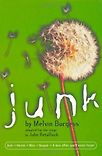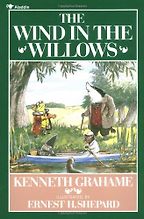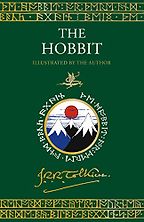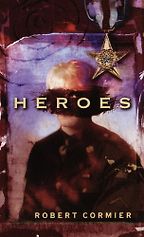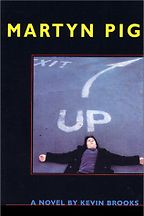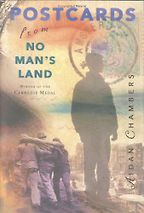On your website you describe yourself as not doing very well at school and getting into writing via journalism. But despite all that, did you actually enjoy reading children’s books when you were younger?
Oh yes, I did. Reading and writing were the only things I was any good at. I read huge amounts.
What kinds of things were you reading?
The very first one was The Wind in the Willows. I loved animals and wild life so I read a lot of wildlife stories and animal stories such as The Jungle Book and Gerald Durrell books – he wrote semi-factual books about travelling around the world collecting animals. And there was another book I liked called Finn The Wolfhound. My dad was a big reader so there were bits and pieces like HE Bates hanging around the place. And then I got into fantasy, with Gormenghast and those kinds of things.
You have already mentioned that The Wind in the Willows was the first book you ever read, but considering you have a reputation for writing about hard-hitting subjects like smack addicts and teenage sex, I am interested that your first choice is a gentle tale of river folk which was first published in 1908.
Most of the books that I have picked are really teenage fiction because that is my area but this is the very first book I fell in love with. I just adored The Wind in the Willows. It was first read to me and then I read it and took it into school to be read. I really loved the cosy chapters in particular.
There are two sides to The Wind in the Willows. There are the Toad chapters where he is out having adventures. But there is also a big theme in the book which is about home – for example, the chapter “Dulce Domum” where Mole finds his house again and when the little Otter gets lost and the great god Pan comes along and helps him. I loved them so much my parents actually had someone paint a picture of Pan for me on my wall. I was just really taken with those romantic, nostalgic, homely types of things at that time. It wasn’t until much later that I started becoming interested in the relationship between fiction and real life.
Why do you think you were so taken with those descriptions about home?
They were just so cosy and warm and snugly. The fiction that I liked when I was young was very much about cosy little adventures with animals and that sort of thing. I didn’t even really like The Famous Five by Enid Blyton because it was a bit too realistic.
What characters did you like best in The Wind in the Willows, because lots of people do go for Mr Toad, who is much more flamboyant – stealing cars, going to prison and escaping dressed as a washerwoman – rather than Ratty or Mole?
No it was the Mole and the Rat for me. There is a lot in the book that isn’t about Toad. There is one chapter when Rat is tempted to leave and go off travelling because the swallows are leaving, but in the end he decides home is more important. And, of course, all of Toad’s adventures end up with him trying to recapture his home, so that is very much a central theme to the book.
I saw a play of it recently that was lovely, but I was thinking twice about reading it to my children, who are seven and six. Do you think this book still works for today’s children?
I read it to my kids and they did enjoy it, although I am not sure they enjoyed it as much as I did!
So maybe it is more of a book for our generation, which brings back the nostalgia of childhood?
Maybe, but you can always try it on them. Read a short bit each night and if they get bored they get bored. It will be interesting to see how it goes.
Next up is another British classic and now a multimillion-dollar Hollywood movie, The Hobbit by JRR Tolkien. This book presumably was the start of you getting into fantasy.
Yes, I have always thought that The Hobbit was a better book than Lord of the Rings. It was tighter and better. I remember discovering it and it launched me off on a big fantasy thing. When I was a kid there weren’t very many Dungeons and Dragons books. But there were all sorts of other things. There was another book called The Little Grey Men, which was about three gnomes, and I really enjoyed that one. I think at that point I was enjoying fiction because it was escapist.
But there is still a cosy feel to The Hobbit. After all, it is rooted in England’s Home Counties around Oxford.
Yes, it is all very cosy and homely. Bilbo Baggins is the cosiest hero you could possibly imagine.
What are your favourite parts of the book?
The bit I remember particularly is the dragon, Smaug. I love myths – I could have put any number of them in my list of books. When I was a kid my dad worked for Oxford University Press and they published a whole series of myths and legends including Tales of the Norse Gods and Heroes by Barbara Leonie Picard. I read this book over and over again. Tolkien was a professor of Anglo-Saxon at Oxford and he had readings of the Icelandic sagas while he was there, so The Hobbit is full of that kind of imagery.
Many years after reading those myths I wrote a pair of books, Bloodtide and also Blood Song, which were modernised versions of the Icelandic Volsunga saga. In Barbara’s original book that saga was in there.
Let’s move on to teenage literature with Robert Cormier’s Heroes.
Robert Cormier is the man. He was doing stuff for teenagers long before anyone else was there. And it was so brilliant. I think he is the single most important writer in this genre by a long chalk. It is still fabulous stuff. I was reading Heroes recently, but you could pick any one of a number of his books.
What happens in this book with the hero, Francis?
He is a young man who has just come back from war. He signed up to fight because everyone wanted to go and fight the Nazis, but of course it did not turn out as he expected. He suffered a terrible injury – he lost his face. As a result, when he comes back, no one can recognise him. There also is a girl he loved before he left and there’s a guy who ran the local youth club who everyone adored and thought of as a big hero. But there is also a dark secret hidden in the past…
Basically Francis has come back to shoot this guy. Throughout the book you discover what this chap did, how it affected Francis, what happened with his girlfriend and how this hero betrayed him. Francis has a medal for bravery – he fell on a grenade. Everyone thought it was to save his mates, but in fact, he was trying to end his own life. He was scared and he wanted to die.
What makes this book more for teenagers rather than adults? And how would you define teenage literature?
It is very difficult to do that, because by the time you are a teenager you are becoming an adult. I don’t think there is any very clear line, except that it does usually have a teenager in the book. But Robert Cormier did cover a lot of the things about becoming who you are. Most of his books are coming-of-age stories.
When you were writing your books Junk and Doing It, which are two hard-hitting coming-of-age stories, how did you go about that?
Those two books in particular are areas that I was very interested in when I was that age! I felt as though there was a real lack of honesty and directness. I find that very often, when adults are thinking about some of those difficult subjects with young people, they go into educational mode. The point about those two books was to try to make them authentic and real. When I am thinking of themes for teenage books it really is a question of entering into your characters. And if you are accurately and fully getting into characters that are that age then those kinds of themes present themselves.
How do you go about getting accurately into those characters because quite often when adults try to be “down with the kids” it doesn’t work – so how did you manage it?
You have to avoid trying to “get down with the kids” at all costs! It just looks so bad and pathetic. But if you are writing novels you do have to put yourself in the shoes of characters of all ages and all kinds. People often ask me, “How do you keep up with today’s kids?” But, of course, people rarely do that. You have to engage with yourself when you were that age and imagine what it would be like if you were a different person of a different age or even a different gender in other situations. There are a lot of pitfalls – things like “getting down with the kids”, trying to educate the kids, trying to think like today’s kids, trying to share your great knowledge and that kind of thing. But, at the end of the day, anyone who is older than a teenager has been a teenager at one point so we have all had that experience and it should be possible for everyone to engage with it.
What kind of feedback do you get from your audience?
It varies depending on the book. But some people like the fact that someone is writing about these sorts of things in a straightforward way. I remember in the first scene of Junk a boy is trying to get his hands down a girl’s pants and a girl said to me that just having that in was refreshing because it was the sort of thing that did happen – but never in fiction. Because it is quite an accurate story of how addiction affects people and their relationships. I also got a lot of emails from people who found it really useful because their parent, sister, brother or friend had had those kinds of experiences.
And why do you think that Robert Cormier remains the king of this genre?
There are two things that make him the king of it. One is that he was doing it way before everyone else. When Junk came out a lot of the fuss and noise which surrounded it was because it was a teenage book which addressed teenagers in a fairly direct kind of way. But Cormier had been doing it decades before. He hadn’t tackled those subjects particularly because he was a thriller writer. But he did lay the groundwork for the whole genre. Not only that – he is just so good. Plot, character, and a beautiful prose style. His books work today as well as ever.
He was a thriller writer with a dark sense of humour just like your next author, Kevin Brooks, and his book Martyn Pig, where the son accidentally kills his dad.
Yes. I really like his writing. He is the nearest thing that Britain has got to a Robert Cromier figure. There are two things I particularly like about his work. In the UK this genre is still relatively new and I think that Kevin laid a lot of the groundwork for thrillers for this age group. And now they have become a huge genre. And he does it with an enormous degree of style and class.
And the other thing that I really enjoy is that they are thrillers but they are kind of back-to-front thrillers. I am a big fan of Japanese fiction. They do some wonderful things with thrillers. It is sometimes done from the villain’s point of view and Kevin does things like that as well. With Martyn Pig the lad accidentally kills his dad and it is such a great set-up and it is done so well. It was his first book. It is very difficult to surpass and I really admire and like it.
Let’s finish off with Aidan Chambers who is a fellow Carnegie Medal winner. Postcards from No Man’s Land has two stories running through it.
That’s right. I sometimes get called the godfather of teenage fiction in this country and it is not really true because he was there well before me, tackling all these kinds of subjects in a very different way. They are really quite intellectual, intensely literary novels which are very dense. But they are terribly engaging, entering into the mind of, as he described it himself, “a rather particular kind of boy”. I love the way he deals with those subjects in a much more intellectual way than I would. He really set the ground for teenage fiction in this country.
Postcards from No Man’s Land is undoubtedly his best book. He follows two parallel stories – one set in 1944 and the other of Jacob in the present day, going back to honour his grandfather’s death at Arnhem in World War II. He meets up with the family of the people who looked after his grandfather (also called Jacob) during his last days. It is a beautifully crafted novel, as Jacob comes to terms with all sorts of difficult discoveries. Despite its intellectual nature – the characters spend hours just talking about things – it is a joyful story, full of optimism and hope. I re-read it recently and thought it was better than ever.
One final question, why do you like writing for that particular audience?
I like the way that teenagers are quite happy to enter into a fantasy-reality mix of scenario which adult fiction finds quite difficult. When I was a kid we didn’t have teenage fiction. There was a lot of horror and a lot of science fiction and sci-fi was always prepared to take a great leap of faith and come up with unbelievable scenarios which could carry you to really interesting places. Teenagers are often prepared to take a bigger leap of faith than adults are.
On the other hand young people by and large aren’t going to sit around and wait while you get on with your wonderful prose and fart around trying to do something arty just because they feel they should. You have to do what you do well. Sometimes I feel in some adult fiction that authors manage to pull a great trick on the readers in that if you don’t like it, you aren’t really up to it. Kids aren’t going to fall for that one. No one has told them what they ought to be enjoying.
October 16, 2011. Updated: June 4, 2025
Five Books aims to keep its book recommendations and interviews up to date. If you are the interviewee and would like to update your choice of books (or even just what you say about them) please email us at [email protected]
Support Five Books
Five Books interviews are expensive to produce. If you've enjoyed this interview, please support us by donating a small amount.
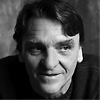
Melvin Burgess
Melvin Burgess is a British author of children’s fiction. His first book, The Cry of the Wolf, was published in 1990. He gained a certain amount of notoriety in 1996 with the publication of Junk, about heroin-addicted teenagers. Burgess again caused controversy in 2003, with the publication of Doing It, which dealt with adolescent sex. America created a TV show based on the book, Life as We Know It. In his other books, such as Bloodtide and The Ghost Behind the Wall, he has dealt with less realist and sometimes fantastic themes. Burgess was a speaker at the Battle of Ideas in London, organised by the Institute of Ideas

Melvin Burgess
Melvin Burgess is a British author of children’s fiction. His first book, The Cry of the Wolf, was published in 1990. He gained a certain amount of notoriety in 1996 with the publication of Junk, about heroin-addicted teenagers. Burgess again caused controversy in 2003, with the publication of Doing It, which dealt with adolescent sex. America created a TV show based on the book, Life as We Know It. In his other books, such as Bloodtide and The Ghost Behind the Wall, he has dealt with less realist and sometimes fantastic themes. Burgess was a speaker at the Battle of Ideas in London, organised by the Institute of Ideas

